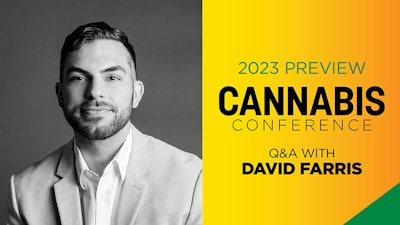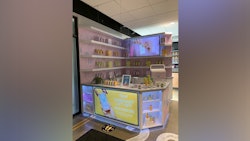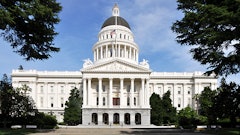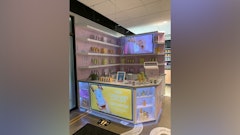
From its sensory-activated, interactive gadgets to its Aerial Orb Show that takes place at the top of every hour on the dispensary floor, Planet 13 has become known for its unique and immersive retail experience.
The company uses experiential marketing to create an immersive environment for consumers, where they can learn about cannabis and purchase products while creating memories and enjoying entertainment features.
From its 112,000-square-foot SuperStore in Las Vegas to its neighborhood-model stores in Florida, the company strives to design each location with elements that complement the markets in which they reside.
Here, David Farris, the vice president of sales and marketing at Planet 13, describes what makes the company's experiential retail model so successful, critical factors operators should consider when transitioning to this model, its associated challenges, and much more.
Editor's note: David Farris will speak at Cannabis Conference on "Experiential Marketing: 10 Lessons On Creating An Immersive Dispensary Environment In A Competitive Market" from 9 to 10 a.m. on Thursday, Aug. 17. In this candid session, attendees will learn how dispensaries are venturing out into experiential retail, and how they can use this model to stand out in a crowded market while increasing customer engagement and loyalty. Visit www.CannabisConference.com for more information and to register.
Andriana Ruscitto: What is experiential marketing, and how can retailers utilize it to stand out in a competitive market?
David Farris: Experiential marketing is being able to convey, especially to our visitors, an experience. The way I look at experience is that an experience can be through customer service, through activations, and through the product itself. We take this approach where we want to have a beautiful facility, a beautiful set of products, and a great staff and service. What we try to do on the marketing side is convey that, speak that into photos [and] into messaging. We're more fortunate where we have so much fun stuff going on, making it easy for the marketing team to showcase that.
I would say that in a saturated market where a lot of people are doing the same type [of] model, where it's a gas station-type transactional store for cannabis, we've taken a much different approach where we have activations that are taking place, shows that are going on in the ceiling while they're shopping, and we invite a unique audience who would rather shop in-store than purchase online. I think that's a compelling story.
AR: Dispensaries nationwide are starting to tap into the experiential retail space. And Planet 13, precisely, has become known for its innovative and immersive approach to experiential retail and for being a "destination" for consumers. Can you briefly describe some key elements of Planet 13's experiential marketing strategy? What makes it so successful?
DF: One interesting perspective and how we kind of tackled it is that we want our customers to promote this store just because they had a great experience inside the facility. We encourage people to take photos and share them with friends and family. A lot [of our] success is through word of mouth. That is a very effective tool, especially starting in the cannabis industry, [where] there are a lot of restrictions in terms of advertising. Things can be more costly, and the cheapest way to grow awareness is for your customers to share their stories and positive experiences. Especially in our first few years of business, a lot of our growth was because people had a fun time and went to a place in Las Vegas that they've never even considered was possible many years ago.
I think that's what makes us most effective, is letting our customers speak on behalf of us and recommend us to their friends and families who are traveling to Las Vegas. One interesting way we capture this experience is through social [media] and through content-focused advertising where they can see the store, believe it, and understand it. We love communicating that we're the world's largest dispensary where they can see this facility and make sense of it. Because sometimes, when people think of the largest store in the world, they don't know how to process that. So, I think content is important when conveying that experience and how that customer journey develops.
AR: How does the company navigate the challenges and restrictions of advertising cannabis on social media?
DF: We experience it very much like all the other [companies]. I think that as you develop a greater name, it becomes harder and harder, where there's more potential for being shut down and almost de-platformed, I would say. We alter our strategy depending on the social channels.
One example is we have a lot of in-store screens where we communicate events that we're having or [an] intended activation. We always have to alter messaging for it to go on social media so that we remove any of those words or visuals that can be flagged or allow us to be shut down. We're constantly thinking that way. It is very restrictive.
You can make one flyer for an event and have to change it many times depending on what platform it is, how it's being messaged and where it's going, and that is very hard on the cannabis industry.
We're very hopeful, especially with Twitter allowing [cannabis] ads, and [we are] going through the process where we have just begun that and just started doing that. We're excited to see that there is movement. I think there's a future where cannabis can live on social media, and it will thrive, but until then, we're almost battling in an arena where we're not supposed to be there and are frowned upon, but it's just tough to navigate.
AR: What are some critical considerations for retailers looking to use experiential marketing to transform their brick-and-mortar locations into a destination for customers, rather than a "pit stop?" What are the critical challenges associated with this?
DF: It's definitely not easy. You don't have to be a large superstore to achieve our experiential retail model. Specifically, as we expand to Illinois and Florida, where we have some more neighborhood-type stores and those facilities, we are faced with that question as well.
I think in terms of brand activations, in terms of the customer journey, [it’s] making sure that it's not just, 'Hey, you stand in this line for 30 minutes and then you see a budtender and they don't ask how your day is, and it's very transactional.' A part of a neighborhood store being kind of experiential is giving them that experience that they want to share and that they want to come back to. I think that's more than just having a cool robot in the corner and could definitely create some photo moments and critical space that people want to hang out at and be at, but it's a blend of who you are and your identity at the store.
We're starting to see that in a lot of retail models just as a whole outside of cannabis, where you're starting to see more clothing stores trying to be diverse in that way, where they have a location where there's lounge seating, where customers can sit down, hang out and not feel rushed. We will continue to see that because the ultimate thing we're faced with is why a customer would come inside versus ordering online, and you have to create that differential for that customer.
AR: How can cannabis companies diversify themselves within the experiential marketing space?
DF: I would preface by saying it varies based on the state that you're in, on what you can do and what you can't do. I'm a big believer in, especially on the brand side, creating activations and utilizing vendors in your store to create memorable experiences.
We've done some really fun things depending on where you're at and where you're located, where there are promotions, where if you buy certain products, you get a free ticket to the food truck outside and [we’ve] hosted events. We've done caricature artists where they're drawing customers, and it's just a part of a fun atmosphere where this is becoming their local store [and] why would they go anywhere else? Because it's just a really cool place that always has things going on and reasons to come visit. Even on the local store side, [it’s] transitioning to creating these experiences, these events and activations with the vendors so that they can talk to the customers on what their product is, why it's different, why it's unique, maybe going through a little bit of a class and educating them.
There [are] always things you can do that don't take a ton of money or the right resources. In a saturated market, you have to think outside the box. You have to be a differentiator and look at those opportunities. I do think that those are different, again, depending on where you're at and where you're located, but I think you have to try different things. And we haven't gotten it perfect the first time. We've changed how we've marketed and how we've created experiences a handful of times throughout that process. Customers are very vocal, and they'll tell you what they love and what they don't love, and that's cool. You just have to listen and give feedback. One thing that we've done in Orange County, specifically, is created a farmer's market for local businesses out front of our facility because we have the parking and we have the location for that, where different vendors came out. It was a cool atmosphere where just while people were coming in over the weekend, they wanted to buy cannabis. They also got some food. It was a cool opportunity where that would probably not be something that would be a good fit for our Las Vegas location.
AR: What is one thing you'd like attendees to take back to their business after attending your session this year?
DF: The one thing that I want them to take away is the way to approach these situations and think about how to create this experience and how to win over that customer, especially in a competitive market that we're seeing in a lot of these recreational markets. It varies on what will work, but I think [it’s about] trying those things, creating those excuses to market to your customer besides just, 'Hey, this is on sale today and this is the same product that we've had for two years.' What is new and exciting? Keep them coming back. What can improve that retention? I think for a lot of the visitors that come to the conference, [they] have control over that and are either small business owners or represent marketing for these larger enterprises. Activity is important in this space and always being in the ‘what's new and what's exciting’ is important. In this social media age and this age that we're in, we have to keep our foot on the gas and keep trying things.
Editor’s note: This interview has been edited for style, length and clarity.
Join us this year at the Paris Las Vegas Hotel & Casino for Cannabis Conference, the leading education and expo event for plant-touching businesses.
























